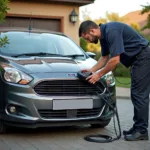Starting a car service station can be a lucrative business venture, but it requires careful planning and execution. From understanding your target market to navigating legal requirements, there are numerous factors to consider. This comprehensive guide will walk you through the essential steps of how to set up a car service station, providing valuable insights and expert advice to help you succeed.
Defining Your Niche and Target Market
Before diving into the logistics, it’s crucial to identify your niche and target market.
- What specific car services will you offer? Will you focus on routine maintenance like oil changes and tire rotations, or specialize in more complex repairs such as engine diagnostics and transmission work?
- Who are your ideal customers? Are you targeting individual car owners or businesses with fleets of vehicles?
Understanding your niche and target market will shape your business plan, marketing strategies, and even the location of your car service station.
Crafting a Comprehensive Business Plan
A well-structured business plan is the backbone of any successful venture. It serves as a roadmap, outlining your goals, strategies, and financial projections. Your business plan should include:
- Executive Summary: A concise overview of your business idea and objectives.
- Company Description: Details about your car service station, including services offered, target market, and competitive advantages.
- Market Analysis: Research on the automotive industry, local competition, and potential customer base.
- Organization and Management: Information about your team’s experience and qualifications.
- Services and Pricing: A detailed description of your services and pricing strategies.
- Marketing and Sales Plan: Strategies to attract and retain customers.
- Financial Projections: Forecasts of revenue, expenses, and profitability.
Choosing the Right Location
The location of your car service station can make or break your business. Consider these factors:
- Visibility and Accessibility: Choose a location with high visibility from the road and easy access for vehicles.
- Traffic and Demographics: Research traffic patterns and demographics in the area to ensure a steady flow of potential customers.
- Competition: Analyze the proximity of competitors and identify ways to differentiate your car service station.
- Zoning Regulations: Check local zoning laws to confirm the area permits automotive businesses.
Equipping Your Car Service Station
Investing in the right equipment is essential to provide quality services and operate efficiently. Consider the following:
- Essential Tools and Equipment: Diagnostic scanners, lifts, air compressors, tire changers, and hand tools are just a few examples.
- Technology and Software: Modern car service stations benefit from sophisticated diagnostic software, online booking systems, and inventory management programs.
- Safety Equipment: Prioritize safety by equipping your station with fire extinguishers, first aid kits, and other necessary safety gear.
Building Your Team
Your team will be instrumental in your car service station’s success. When assembling your staff:
- Hire Skilled Technicians: Seek out experienced and certified technicians who can provide high-quality repairs and maintenance services.
- Prioritize Customer Service: Train your staff to interact with customers professionally and courteously, fostering positive relationships.
- Offer Ongoing Training: Encourage your team to stay updated on the latest automotive technologies and repair procedures through continuing education programs.
Legal and Regulatory Compliance
Navigating legal and regulatory requirements is crucial to operating a legitimate and ethical car service station. Key considerations include:
- Business Licenses and Permits: Research and obtain all necessary licenses and permits to operate legally in your city and state.
- Environmental Regulations: Comply with regulations regarding hazardous waste disposal, such as used oil and batteries.
- Insurance Coverage: Secure comprehensive insurance policies, including liability, property, and worker’s compensation coverage.
Marketing and Customer Acquisition
Once your car service station is operational, it’s time to attract customers. Effective marketing strategies include:
- Online Presence: Create a professional website and establish a strong presence on social media platforms.
- Local SEO: Optimize your online listings for local searches so potential customers can find you easily.
- Traditional Advertising: Consider flyers, local newspaper ads, or radio commercials to reach a wider audience.
- Customer Loyalty Programs: Implement loyalty programs to incentivize repeat business and build customer relationships.
Conclusion
Setting up a car service station is a challenging yet rewarding endeavor. By following these steps and staying adaptable to the ever-evolving automotive industry, you can establish a successful business that provides valuable services to your community. Remember to prioritize quality service, customer satisfaction, and continuous improvement to thrive in this competitive market.
